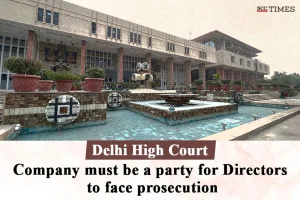Delhi High Court: In petitions filed under Section 528 of the Bharatiya Nagarik Suraksha Sanhita, 2023 seeking quashing of complaint cases against the accused persons as well as the order dated 6-6-2024 (‘impugned order’), wherein the Trial Court had rejected the accused persons’ contention that in the absence of arraignment of the Company as a party, prosecution against the directors alone was not maintainable, the Single Judge Bench of Ravinder Dudeja, J, held that when the alleged act is committed by the company, its officers cannot be prosecuted in isolation. The commission of offence by the Company is the foundation only after liability can be extended to its directors. Thus, the Court allowed both the petitions vide the instant common judgment.
Background
The accused persons in the instant case are directors of SNR Buildwell Pvt. Ltd. (‘the Company’) who had transferred an Audi car in favour of his daughter-in-law without adequate consideration. The Income Tax Department had treated this transfer as void under Section 281 of the Income Tax Act, 1961 and proceeded to prosecute the directors under Section 276 of the Act.
Before the Trial Court, the accused persons had contended that since the Company had not been arraigned as a party, prosecution against them was not maintainable. The Trial Court vide the impugned judgment had rejected the accused persons’ submission and listed the matter. Aggrieved by the same, the accused persons had approached the Court.
Analysis, Law and Decision
The primary question for deliberation before the Court was whether the directors alone could be prosecuted when the company, which is the principal offender, is not arraigned as an accused.
The Court noted that Section 278B of the Act clearly states that where an offence is committed by a company, “the company as well as every person in charge”, shall be deemed guilty. Section 278B creates a deeming fiction whereby both the Company and every person in charge are deemed guilty of the offence. The legislative intent is clear that the Company must first be arraigned, only then can its officers be fastened with vicarious liability.
The Court relied on the case of Aneeta Hada v. Godfather Travels & Tours, (2012) 5 SCC 661, wherein the Supreme Court had held that in a case against the directors under a vicarious liability provision, the Company being a juristic person, has to be impleaded as an accused. The commission of an offence by the Company is the foundation and only thereafter can liability be extended to its directors.
The Court stated that in the instant case, the accused persons had been arraigned solely as ‘directors’ and no separate allegation had been made against them in their personal capacity. Further, the Court noted that the show cause notice sent to the accused persons made it evident that the omission of impleadment of the Company was not a mere technical irregularity but rather went to the root of jurisdiction.
Thus, the Court held that continuation of prosecution against the accused persons as directors alone without impleading the Company as an accused would be contrary to law and amount to an abuse of process.
[Nilesh Agarwal v. Income Tax Office, 2025 SCC OnLine Del 6433, decided on 9-10-2025]
Advocates who appeared in this case:
For the Petitioner: Arjun Dewan, Akash Arora, Jasraj Singh Chhabra, Advocates
For the Respondent: Sunil Agarwal, Senior Standing Counsel, Viplav Acharya, Priya Sarkar, Junior Standing Counsels, Utkarsh Tiwari, Advocates

